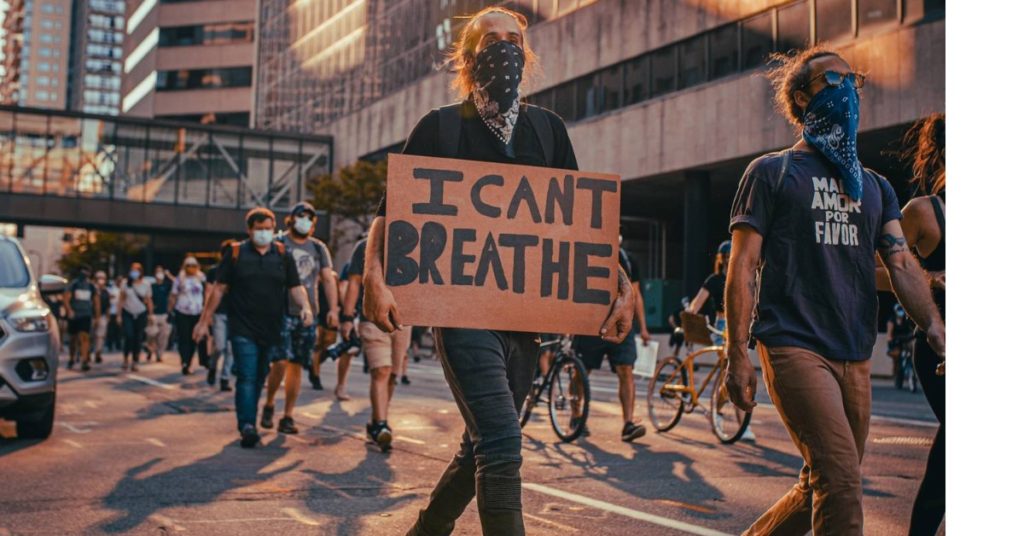Before I started to share #blackliveesmatter content I wanted to take some time to go away think about my own action, lack thereof, my own voice and ask myself “how I will I change so I am actively being a non-racist?’. I’ve wanted to internally address the fact that I’ve lacked the necessary pro-active self-education when it comes to race, culture, religion and every-day discrimination. I’ve always considered myself to be ‘open’ and culturally aware, but it’s not enough.
Racism continues to exist, even if we don’t see it happening in our lives or communities – it’s been ingrained into our societies. Things have to change. And the best way for me to start the conversation was with those closest to me, however, I was surprised that many did not share my views or see the world through my eyes. That right there is the conflict we have to live with, people won’t always share your views, join you in your sadness or empathise with a situation in the same way.
I’ve been deeply saddened by the news of George Floyd who lost his life at the knee of a police officer on 25 May 2020. It feels so tragic that a man had to die to for the world to wake up and admit that racism still exists and that ‘we’ as a society are complicit – if we do nothing – nothing changes. When people say ‘all lives matter’ in response to the black live matters movement – I now know why people get furious. Because now is time to shine the spotlight on the injustice and discrimination that black people have faced for hundreds of years. Black people are not saying that they believe that only black lives matter – but injustice to George Floyd this is about them. This is about what they have suffered. It’s not about you, or me or other ethnic groups – this is a wake-up call to tell the world black people are fed up of a life-time of discrimination. And I stand by them, we need to listen and learn and adapt our ways of thinking and behaving.
As I mentioned before, I was reluctant to speak out, I wanted to take some time to look within and consider all the moments I have seen racism at play – and how I have responded. I’ve had chats with friends, with my partner, with my clients and with members of the Ethical Brand Directory family. I’ve been online watching videos and trying to educate myself and not shy away from conversations where I know I am not being a good enough ambassador for equality amongst the black community – I know I am not doing enough.
I’ve held off on publishing this article as I haven’t finished all my research and I wanted to share a list of useful resources and share all the documentaries I’ve watched, articles I’ve read, new conversations I have had…. but there is no ‘end-point’ to this journey of self-learning. So I am publishing this blog now, as it’s July… and the death of George Floyd was back in May (may he RIP) I realise there is never going to be a time when this blog ‘has everything’ I wanted to share in it.
Step 1) Learn about racism

We’ve all seen the rise of the hashtag #BlackLivesMatter trending on social media – and the uprise of citizens across the globe marching for equality and the end of systematic racism. The news has shown that BLM demonstrations have attracted massive support and taken place in public squares from London, Paris to Amsterdam to Auckland. People are fed up and it’s time that we embrace all humans as equals – instead of saying we are ‘aware’ of racism, we need to take action and end this.
But many of us, myself included have lacked the knowledge or not been able to identify with many of the stories we hear about systematic racism. Discrimination based on race and ethnicity has been around since what seems like the beginning of time. It’s hard to dispute the data which shows the many disparities between people of colour and their white counterparts. In the US it is particularly bad – and when I was researching data I found an organisation called Do Something, I strongly recommend you read the data that is highlighted as it speaks for itself.
It’s uncomfortable to admit that you don’t know enough about racism. And that by not speaking out, and taking action – that we have been part of the problem.
The first thing I did was to take a deeper look at the organisation Black Lives Matter. They are an international human rights movement, originating from within the African-American community. Their work focuses on campaigns that speak out against violence and systemic racism towards black people.
I’ve also found an article written by Reni Eddo-Lodge it’s called “Why I’m no longer talking to white people about race“.
A quote that struck me hard was: ” Not seeing race does little to dismantle racist structures or improve the lives of people of colour. In order to do so, we must see race. We must see who benefits from their race, who is affected by negative stereotyping of theirs, and on whom power and privilege is bestowed – not just because of their race, but also their class and gender. Seeing race is essential to changing the system.”
The next thing I looked at was how racism exists within fashion, this is when I found an article titled: Does fashion have a cultural appropriation problem? and that led me to look at all of the images we see, and how we see a very disproportionate number of white models on the runway, in magazines and across advertising in general. And then I started to think about how we take things from different cultures for fashion.
Step 2) Understand Cultural Appropriation
Remember in the ’90s when Gwen Steffani used to wear a Bindi? And when it was all the rage to wear a qipao (a traditional Chinese form-fitting dress worn by women) and how dragon print was a trend? But looking back over my own unaware choices, I realise I have played my part in this too. I used to think it was cool was having my hair braided, I realise now how was culturally inappropriate it was, this is just an example of how we make these choices without even considering what it means. Fashion has a huge role to play when it comes to showing diversity, representing cultures appropriately and setting a standard for what people believe to to right. There is so much inequality in fashion – and this has to change and we need to be the ones that demand better.
So what is cultural appropriation? Dr Serkan Delice, a lecturer in cultural and historical studies at the London College of Fashion says that “cultural appropriation only happens when there are power inequalities between different cultures” She says “cultural appropriation implies that a more powerful culture is using another less powerful culture.”
I also found this video that helps explain it too:
STEP 3. DO SOMETHING ABOUT RACISM
The first thing I have done is look at our team and I am pleased to say we do have a great mix which includes Spanish, Macedonian, Indian, French and white-British – but we still lack ethnic diversity in the brands that we promote on the directory. So I am going to look at how I can bring more black-owned businesses into our community.
My goal is to be proactive and seek out amazing ethical and sustainable brands that are owned by a broader mix of ethnicities. EBD was built on the premise of community, and acceptance, where being inclusive and embracing people’s differences is the norm, we are focused on shared values – and strong design aesthetic.
As we move forward, we will look at ways to improve what we do – and how we do it. Taking any constructive criticism as a blessing. We are far from perfect – and we know that we have a long way to go. One of the things we are passionate about is providing a platform that welcomes people. We will look to review our language used, the photography we use in our marketing, the models we book for shoots with a clear goal of promoting diversity, whilst be culturally sensitive.
If you want to nominate any black owned businesses, whether that’s fashion or beauty brands for our directory please add their details in the comments.
Many thanks for taking the time to read this article.
Stay safe, stay informed – and take action.

Roberta Lee
Founder of Ethical Brand Directory
